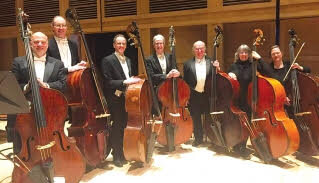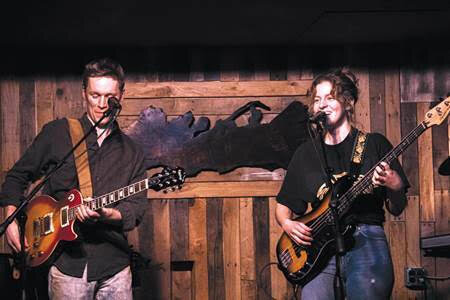The New England Musician’s Relief Fund: A lifeline for musicians in need
Featured in The Maine Edge
Michael Dow
January 18, 2021
Anthony D'Amico with the rest of the Portland Symphony bass section. L-R Tony D’Amico, George Calvert, Brian Thacker, Joseph Holt, George Rubino, Lynn Hannings, and Margaret Metcalf.(photo courtesy of Anthony D'Amico)
How scary has the shutdown been for musicians? Many professional players and music teachers have spent most of their lives working toward the goal of supporting themselves and their families by playing music. Some are classically trained and have spent years or decades mastering their craft after obtaining prestigious and pricey degrees while others are self-taught. Many rely on filling their schedules with gigs wherever they can find them in restaurants, bars or at weddings. For those who can do it, it’s a dream come true, but when it all stops, the black void of uncertainty that is our current reality can be soul-crushing.
Soon after last spring’s shutdown, the New England Musician’s Relief Fund (NEMRF) was established to assist musicians in easing the financial strain. Nine months later, the fund has distributed more than $300,000 to musicians in New England and New York’s Upper Hudson Valley to help make ends meet.
The live music industry has been decimated, leaving thousands of professional freelance musicians in New England with very few options to fill the economic void. Despite the presence of a vaccine and the general hope that they’ll soon be able to resume live performance in some capacity, many musicians and music teachers are in crisis mode as indoor gathering limitations remain in place and unemployment benefits have either expired or never existed, depending on their situation.
Banding together
The New England Musician’s Relief Fund is largely made up of small grassroots donations from private individuals, according to Anthony D’Amico, a NEMRF board member and a freelance musician who lives about 35 miles outside of Boston. D’Amico serves as principal bass of the Boston Modern Orchestra Project, the Boston Philharmonic, the Rhode Island Philharmonic and Portland Symphony. He’s also a frequent collaborator with the Boston Pops, and a participant (during a normal year) in the Sebago-Long Lake Chamber Music Festival of Maine.
According to D’Amico, the money distributed by the NEMRF goes out to musicians as fast as the fund can receive it. “The money comes in and goes out,” he said. “Since the unemployment benefits started to run out, we’ve really seen an uptick in requests.”
The fund’s eligibility requirements state that applicants must live in the five contiguous New England states, and that at least 50 per cent of their income must have come from employment as a performing musician and/or music teacher in the three calendar years 2017-2019. Links to apply for relief or to make a contribution to the fund can be found at the bottom of this story.
Violinist Katherine Winterstein of the Vermont Symphony said push is coming to shove for many professional musicians.
“For some of us, it’s already game over, for others it’s a struggle to redefine what we do,” said Winterstein, a musician, teacher, and single mother, in a press release issued by NEMRF. “It is no longer a question of endurance as much as it is a question of whether or not we can meaningfully adapt to the limited set of options in this new world. It’s hard to even consider those questions when basic survival is still on the line.”
The indie folk duo Gentle Temper is closely associated with Boston where they formed in 2016. Multi-instrumentalists and vocalists Ryan Meier and Marion Earley were 2019 Boston Music Awards nominees for “Folk Artist of the Year,” and “New Artist of the Year.”
The pair moved to Winterport with their dogs in the summer of 2019, a year that saw the duo perform more than 190 concerts – most of them in the northeast, Michigan, Illinois and Missouri. In 2020, that number was reduced to 28, nearly all of them performed in the first two months of the year. Their most recent concert was a socially distanced event at Bangor Arts Exchange last October.
Earley said in an interview that her grant from the New England Musician’s Relief Fund arrived about a month after she applied, just as her unemployment benefits were running out.
“The check from NEMRF arrived at just the right time over the holidays to help keep me afloat while I seek some work that I can do remotely,” Earley said. Meier said he applied for a NEMRF grant and has been in contact with the organization and expects to see it soon.
To be, or not to be
Both say that that some of their fellow indie freelance musicians have been forced to abandon music as a vocation altogether.
“In Boston, you’re put under this pressure of either being a full-time wedding musician or you have a day job and perform sometimes at open mics or you have some shows here and there where you make $500 for a gig that cost you $600 to promote,” Meier said. “With everything on hold, we’ve become a little more self-sustaining, honing our craft on Patreon and trying things I wouldn’t have had time to do otherwise.”
The Patreon platform allows content creators like Gentle Temper to offer membership-based subscriptions to keep their presence alive while helping to make up some of the revenue lost to cancelled gigs. Meier says he’s working on a new video for the platform as the duo continues to develop their music.
“In a way, I feel like I’m 16 again, when I think ‘Man, I can’t wait to get to the point where I can play my music in front of people,’” Meier responded when asked about the future. “We’re taking this one step at a time, creating content and working toward more releases.”
Both musicians said they don’t expect live music to return as we knew it until summer 2022.
“That sounds kind of bleak but when this pandemic started, it was with the thought that we’d all stay inside for two weeks, but some people couldn’t even do that,” Meier says. “Since many venues have gone under since then, the landscape will have to recover first.”
Earley said she doesn’t anticipate that festivals and intimate venue shows will return in full swing this year, but she expects more socially distanced “drive-in” concerts will happen this summer like they did last year.
Gentle Temper plan to release a new single this winter, a follow-up to last fall’s sublime “Good Talk,” a brisk melodic blast of acoustic folk-pop.
Falling between the cracks
Since most freelance musicians are considered independent contractors under state statutes, they are not eligible for traditional state unemployment insurance that is paid for through unemployment taxes by the roughly 45,000 employers in Maine, according to Jessica Picard, spokeswoman for the Maine Department of Labor.
“At the beginning of the pandemic, Congress created the Pandemic Unemployment Assistance (PUA) program in order to cover people who are not typically eligible for state unemployment insurance, such as independent contractors,” Picard told The Maine Edge. “PUA benefits are paid for through federal funds, not the state’s Unemployment Insurance Trust Fund.”
Such federal funding helped those falling outside the traditional employment situation, including musicians, actors, hair stylists, truckers, contractors and anyone else who was self-employed and worked for themselves. However, full federal funding for PUA ended Dec. 26, affecting about 7.3 million workers nationally. On Dec. 27, President Donald Trump signed the bipartisan COVID-19 relief legislation that extended federal unemployment programs, including PUA and Pandemic Emergency Unemployment Compensation (PEUC), through at least March.
Picard said the MDOL recognizes that eligibility requirements can be complicated, and they encourage anyone who has lost their job to apply for unemployment insurance.
“A determination of eligibility will be made based on their individual situations,” she said. Claims can be filed at https://reemployme.maine.gov/.
Feeling forgotten
Singer and songwriter Carol Noonan of Brownfield believes that many musicians, herself included, have felt forgotten during the COVID-19 crisis. Noonan is a well-known figure throughout New England and beyond for the music she made with her band Knots and Crosses, formed in the late 1980s, and on a series of solo albums for Rounder Records and for her own label, CarolNoonanMusic.com. Her latest album is “Raven Girl,” released in 2017.
Along with her husband, Jeff Flagg, Noonan owns and operates the Stone Mountain Arts Center in Brownfield, a 200-seat destination concert venue for many national and international touring acts. She had to cancel 16 shows last year with her trio, which includes guitarists Duke Levine and Kevin Barry. All of those performances would have taken place at Stone Mountain Arts Center.
As a venue, the facility had to cancel “close to 75 shows and counting,” Noonan said, when you factor in lost shows from acts like Judy Collins, Jonathan Edwards, Los Lobos, Nick Lowe with Los Straitjackets, Paula Poundstone and many others. Many of those performances have been rescheduled for this year. Dates and details can be found at www.StoneMountainArtsCenter.com.
“Every bit helps right now. I’ve gone as far as to say that seeing live music is as essential as going to the grocery store, so to get this support is recognition of our importance in the grand scheme of things," Noonan said of her grant currently being processed by the New England Musician’s Relief Fund. "The application was easy to fill out and not nearly as labored as other relief out there.”
Noonan said she expects the live music landscape will return to limited capacity by this summer.
“I just think people want it,” Noonan said. “I don’t think streaming will satisfy that desire indefinitely, I hope, and musicians will need to work.”
Noonan understands and supports the need for musicians to stream performances online to generate income and to keep their audiences engaged, but she worries that fans will become too used to the practice.
“I worry that we’re training people to get used to seeing music on a screen just as we got them used to hearing it on a phone,” she said. “This time, the format was forced on us, so I completely understand why it’s a vital format for venues and musicians right now. Many of my friends are doing it well and I support them.”
Noonan said Stone Mountain Arts Center has been focusing on the food and beverage side of their business to get by. The venue hosted a series of small shows with a maximum capacity of 50 until November of last year. The venue also provides a free weekly meal for local residents, serving up to 100 per week.
Planning for what comes next
During an interview with The Maine Edge, NEMRF board member Anthony D’Amico said organizers have a goal of growing the NEMRF to an ever-present $5 million fund in order to continue providing financial assistance and critical resources for musicians experiencing unexpected or catastrophic income loss.
The Maine Edge: Once we can officially say this pandemic is behind us, will the fund continue to assist musicians in need?
Anthony D’Amico: Absolutely, in fact we had a three-hour board retreat today and that was one of the big things we discussed. One day the pandemic will end, but there’s always something lurking around the corner and we want to be prepared when that happens. Musicians will always be in need so we would like to see this as a permanent part of the landscape – something that is always there and funded for musicians in the New England area.
The Maine Edge: What is the average donation to the fund and are most donations from private individuals?
Anthony D’Amico: Nearly half of the donations are $50 or less. Two thirds of the donations are $100 or less. The vast majority of donations are made by private individuals. Because the New England Musicians Relief Fund’s not for profit 501(c)(3) status is still pending, we can’t accept donations yet from corporations, but some music organizations have made some great contributions to the fund. The fund is mostly made up of smaller grassroots donations.
The Maine Edge: The current grant amount is $1,000. Is that a one-time only grant or will recipients be allowed to reapply for further assistance down the road?
Anthony D’Amico: Because the need is so great right now, we’re keeping it to one application per person. Hopefully once we see demand start to trickle down, we’ll be able offer a second grant. You hear that these next few months will be the darkest of the whole thing, so we’re a little nervous about that. We keep second requests on file, but we need to take care of our initial applicants right now.
The Maine Edge: Have you heard about any professional musicians who’ve already left the field altogether because of everything that’s happened in the past 10 months?
Anthony D’Amico: Sure, I’ve heard some stories. There have been a few older musicians who’ve chosen to bow out at this point rather than try to stick it out then come back. That’s one thing, but I’ve also heard stories of some musicians who say “That’s it, I had a good run, onto the next chapter.” That’s probably the saddest part of it all. To be without any sort of income for 10 months now, that’s tough. I get it. When you run out of resources and people run out of unemployment benefits, they have no choice.
The Maine Edge: We’ve heard of bars and restaurants that have closed permanently – many of which had employed musicians on a regular basis. What does your gut tell you about the future of some of our concert halls and other venues where live music is performed? Are we in danger of losing them too?
Anthony D’Amico: Definitely. The budgets for those venues were to the bone anyway. A lot of them were just hanging on, especially the smaller ones. I can see a lot of the venues not being able to survive. The aid from the government, while it’s been there, hasn’t been enough. New England is a little short on performance space as it is and definitely short on rehearsal spaces. That’s something we’re going to be dealing with long after this pandemic is over.
The Maine Edge: Put yourself in the shoes of music students currently enrolled or recently graduated - what do you think is going through their minds today?
Anthony D’Amico: The students who are in college and those just graduating are in a particularly tough spot. When this is over, I’ll probably be able to have most of my work restored – I hope. They haven’t even started yet, what a way to start your career with this pandemic. I really feel for those folks just getting out of school now. That’s the other thing – you’re spending all this money to go to a great music school like the New England Conservatory or Berklee College of Music or Boston Conservatory and you’re doing it online and you can’t get together with other students to play. That has to be really tough. That isn’t the scholastic experience that I went through by any means.
The Maine Edge: As a member of the Portland Symphony and a participant in the Sebago-Long Lake Chamber Music Festival of Maine, what does Maine mean to you personally?
Anthony D’Amico: If I could make my living in Portland, I would move there. It’s one of my favorite cities anywhere by far. The Portland Symphony is a fine orchestra and a great group of people, but I get to spend time in that city which makes it all the more rewarding. I love Portland’s architecture, its proximity to the water, the lighthouses, the food, the restaurants. I read an article recently about some of Maine’s restaurants not pulling through which makes me very sad.
The Maine Edge: Is there anything you’d like to add that we didn’t discuss?
Anthony D’Amico: Hopefully the public misses us because we certainly miss them, that’s for sure. If you have value live music and the people who make it, please consider donating whatever you can. It really makes a huge difference for struggling musicians right now.
Marion Earley of Gentle Temper echoes D’Amico’s sentiment. “Please keep supporting musicians any way you can,” she said.
Carol Noonan said nothing compares with the live music experience. She feels the energy transferred to and from a musician and an audience is an inestimable power that can’t be replaced.
“No screen can ever convey that no matter how well-produced it is,” she said. “That feeling of excitement when the lights go down for the audience and that adrenalin kicks in for the musician. There is a labor with recording and filming that isn’t obvious but as a musician you feel it – it’s a weight on you. When you are on stage that weight is absent, it’s a freedom that you can only get playing live, and when an audience gets to see and feel that, it’s just the best.”
Musicians may apply for a grant from the New England Musician’s Relief Fund at www.nemrf.org/apply. Supporters wishing to make a tax-deductible donation to the fund should visit www.nemrf.org/take-action.





